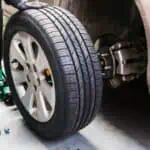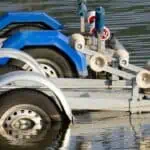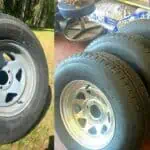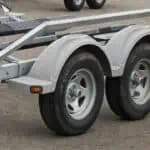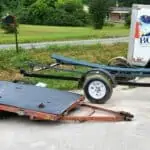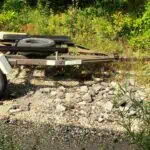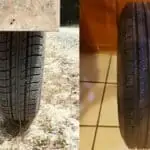If you have a boat trailer, you may be wondering if you can put bigger wheels on it. The answer is yes, but there are a few things to consider before doing so. First, check the weight limit of the trailer.
You don’t want to overload it and cause damage to the frame or axle. Second, make sure the new wheels will fit inside the fenders of the trailer. If they’re too big, they could rub against the fenders and cause wear and tear.
Finally, take into account the height of your boat when it’s sitting on the trailer. If the wheels are too big, they could raise the front of the boat too high and make it difficult to tow.
- Park your boat trailer on level ground and chock the wheels to prevent it from rolling
- Place a jack under the tongue of the trailer and raise it until the weight of the trailer is off the wheels
- Remove the bolts that secure the old wheels to the hubs using a wrench or socket set
- Install the new wheels onto the hubs, being careful to not overtighten the bolts
- 5 Lower the trailer back down and remove the jack
Can I Put Bigger Wheels on My Boat Trailer?
Are Bigger Wheels Better on a Trailer?
One of the most common questions we get asked here at Trailer Wheel and Tire is “Are bigger wheels better on a trailer?” The answer to this question is not as simple as a yes or no. There are several factors you need to take into consideration when deciding what size wheel is best for your trailer.
Some things you’ll want to think about are the type of terrain you’ll be traveling on, the weight of your trailer, and the height of your trailer tongue. If you frequently travel on rough terrain, larger wheels may be a good option for you. They can help reduce the chance of getting a flat tire and will make it easier to maneuver over obstacles.
Keep in mind that larger wheels also add weight to your trailer, which can affect its overall performance. If you have a lightweight trailer, you might not want to go with the biggest option available. You also need to make sure that your chosen wheel size won’t raise the height of your trailer tongue too much.
If it does, you could run into problems when trying to hook up your trailer or back it into tight spaces. Ultimately, the decision of whether or not to go with bigger wheels on your trailer comes down to personal preference and what works best for your needs. We recommend talking with one of our experts if you’re still unsure which size is right for you.
Can You Change the Rim Size on a Trailer?
There are a few things to consider when changing the rim size on a trailer. The most important thing is to make sure that the new rims will be compatible with the existing tires. If the new rims are not compatible, you will need to purchase new tires as well.
Another thing to keep in mind is that changing the rim size may affect the handling of the trailer. If you are not experienced in changing rims, it is best to consult with a professional before making any changes.
Does Wheel Size Matter on a Trailer?
If you’re towing a trailer, does wheel size matter? Generally speaking, no. As long as your trailer’s wheels are the same size as the ones on your tow vehicle, you should be fine.
That said, there are some exceptions. If you’re towing a very large or heavy trailer, the wheels on both the trailer and tow vehicle must be properly rated for the weight they’ll be carrying. Oversized or under-rated tires can lead to problems down the road, so it’s always best to err on the side of caution when choosing tires for your rig.
Another time when wheel size might matter is if you’re doing a lot of off-road driving with your trailer in tow. In this case, larger wheels can help clear obstacles more easily and prevent getting stuck in mud or sand. Again, just make sure that both your vehicle and trailer are outfitted with tires that can handle the terrain you’ll be traversing.
So, in short: as long as your tow vehicle and trailer have matching-sized wheels (and those wheels are properly rated for the weight they’ll be carrying), you should be good to go!
Do Bigger Wheels Affect Towing?
The short answer is yes, bigger wheels can affect towing. But it’s a bit more complicated than that and there are a few factors to consider. For one, bigger wheels will make the trailer heavier.
This extra weight can impact how your vehicle tows the trailer and may even decrease fuel efficiency. You’ll also want to make sure that your tires are properly inflated – underinflated tires can cause premature wear and tear on both your vehicle and the trailer. Bigger wheels can also affect the handling of your vehicle/trailer combo.
A larger diameter wheel will have a higher rotational speed, which means it will take more effort to turn. This could make turning corners or maneuvering in tight spaces more difficult. Additionally, if you’re planning on doing any off-roading with your trailer, bigger wheels could potentially get stuck easier in mud or sand.
So, while bigger wheels might look cooler, there are some potential downsides to consider before making the switch. Weigh out the pros and cons before making a decision and be sure to consult with an expert if you’re unsure about anything!
Can You Put Any Size Tire on a Trailer?
If you have a trailer, you may be wondering if you can put any size tire on it. The answer is yes, but there are a few things to keep in mind.
First, the size of the tire should be appropriate for the size and weight of the trailer.
If you have a small trailer, putting large tires on it could make it difficult to maneuver. Likewise, putting small tires on a large trailer could make it difficult to tow.
Second, keep in mind that the type of tire you choose will also affect how well your trailer performs.
For example, all-terrain tires may be better suited for off-road use, while highway tires are designed for paved surfaces.
By following these tips, you can ensure that your trailer has the right tires for its size and intended use.
Can I Increase My Rim Size?
If you’re looking to increase the size of your rims, there are a few things you need to keep in mind. First, larger rims can impact the handling of your vehicle and may not be compatible with your car’s suspension. Additionally, bigger rims may also require different tires which can be more expensive.
So before you start shopping for those new wheels, make sure you do your research to avoid any issues down the road.
What Wheels Fit My Trailer
If you’re looking to upgrade the wheels on your trailer, it’s important to make sure that you choose a set that will fit. To do this, you’ll need to know the size of your current wheels and axle, as well as the bolt pattern. Once you have this information, you can start shopping around for new wheels.
The first step is to measure the diameter of your current wheels. This is usually easy to do with a tape measure. Once you have the diameter, write it down so you don’t forget it.
Next, you’ll need to measure the width of your axle. This is the distance between the two bolts that hold the wheel in place. Again, use a tape measure and write down this number so you don’t forget it.
Now that you know these two measurements, it’s time to find out what bolt pattern your trailer has. The bolt pattern is determined by the number of lug nuts on each wheel and how they are spaced out around the circumference of the wheel. Most trailers have either a 4- or 5-lug bolt pattern.
Once you know all of this information, finding new wheels for your trailer should be a breeze! Just remember to double-check that everything will fit before making any purchases.
Are Bigger Tires Better for Trailers
If you’re towing a trailer, you might be wondering if bigger tires are better. Here’s what you need to know about choosing the right size tires for your trailer. Tires are an important part of any vehicle, but they’re especially important when it comes to trailers.
That’s because trailers put more stress on tires than regular vehicles do. When you’re pulling a heavy load behind you, your tires have to work hard to keep everything moving smoothly. So, does that mean that bigger tires are always better for trailers?
Not necessarily. It depends on a few factors, such as the weight of your trailer and the type of terrain you’ll be traveling on. If you’re carrying a light load, then bigger isn’t always better.
Large tires can make your trailer harder to tow. They create more rolling resistance, which means your vehicle has to work harder to move the trailer forward. This can lead to decreased gas mileage and increased wear and tear on your vehicle.
On the other hand, if you’re carrying a heavy load or traveling on rough terrain, larger tires can be beneficial. They provide more traction and stability, which is essential when hauling a big load behind you. Just make sure that the size of the tire is appropriate for the weight of your trailer; otherwise, you could end up doing damage to both your trailer and your vehicle.
Boat Trailer Rim Size
Boat trailers are designed to support the weight of your boat and provide a smooth ride. The right size trailer will make towing easier and reduce wear and tear on your vehicle. There are two main types of boat trailers: tandem-axle and single-axle.
Tandem-axle trailers have two sets of wheels, while single-axle trailers have just one set. Each type has its advantages and disadvantages. Tandem-axle trailers are great for larger boats because they provide more stability.
However, they can be difficult to maneuver in tight spaces. Single-axle trailers are easier to maneuver, but they’re not as stable, so they’re better suited for smaller boats. The width of your trailer’s tires is also an important consideration.
Wider tires provide a smoother ride, but they can make turning difficult. Narrower tires make turning easier, but they can create a rougher ride. Choose the tire width that best suits your needs.
When selecting a boat trailer, it’s important to choose the right size for your vessel. If you have a large boat, opt for a tandem-axle trailer; if you have a small boat, go with a single-axle trailer.
Upgrade Trailer Tire Size
When it comes to upgrading the size of your trailer tires, there are a few things you need to take into account. The first is the weight of your trailer. Heavier trailers will require larger tires to provide adequate support and stability.
The second is the type of terrain you’ll be traveling on. If you’re planning on hitting the open road, then you’ll want tires that can handle long distances and varied terrain. Third is tire availability.
You’ll need to make sure that the size of tire you want is available before making any final decisions. Now that we’ve gone over the basics, let’s talk about some specific tire sizes. If you have a small trailer, such as a pop-up camper or utility trailer, then 13″ or 14″ tires should suffice.
For medium-sized trailers, like travel trailers or fifth wheels, 15″ or 16″ tires are typically used. And for large trailers, like RV campers, 17″ or 18″ tires are usually required.
What Tires Do I Need for My Trailer
If you’re like most people, you probably don’t think much about the tires on your trailer. But if you’re planning a road trip, it’s important to make sure your tires are up to the task. Here’s what you need to know about choosing the right tires for your trailer.
The first thing to consider is the size of the tire. You’ll need to match the size of the tire to the size of your trailer axle. The easiest way to do this is to consult your trailer’s owner’s manual.
Once you know the size of tire you need, you can start shopping around. There are two main types of tires: bias ply and radial. Bias-ply tires are cheaper and more common, but they don’t last as long as radial tires.
Radial tires are more expensive, but they offer better handling and durability. If you’re doing a lot of driving, or if you’re carrying heavy loads, radial tires are a good choice. Once you’ve decided on the type of tire, it’s time to choose a brand.
There are many different brands of trailer tires on the market, so it’s important to do some research before making a decision. Read online reviews and talk to other RVers to get their opinion on which brands are best. Finally, make sure you check your trailer’s tire pressure regularly.
Overinflated or underinflated tires can cause problems on the road.
Two Different Size Tires on Trailer
If you have ever seen a truck or trailer on the road with two different size tires, you may have wondered why. There are a few reasons why this is done. First, it can help to improve fuel economy.
When a vehicle is carrying a heavy load, the larger tires can provide better traction and help to reduce rolling resistance. This can lead to better fuel economy overall. Second, it can also improve handling.
Having two different size tires can help to distribute the weight of the load more evenly. This can make it easier to maneuver the vehicle, especially when making turns or going around corners. Finally, it can also be a safety measure.
If one of the tires were to fail while the vehicle is in motion, having a second tire that is a different size can help to keep the vehicle stable until it can be brought to a stop safely. So there you have it! Those are just a few of the reasons why you might see trucks and trailers on the road with two different size tires.
Trailer Wheels
Trailer wheels are an important part of any trailer, and there are a few things to consider when choosing the right ones for your trailer. wheel size, load rating, and hub type are all important factors to consider. Wheel Size
The first thing to consider when choosing trailer wheels is the size. Trailer wheels come in a variety of sizes, from 12 inches up to 22 inches. The size you need will depend on the weight of your trailer and what you’ll be using it for.
If you’re carrying a heavy load or plan on doing a lot of off-road driving, then you’ll need larger wheels. Smaller wheels are better for lighter trailers that will mostly be used on paved roads. Load Rating
Another important factor to consider is the load rating of the wheels. The load rating is how much weight each wheel can safely support. You’ll need to make sure that the total weight of your trailer and its contents doesn’t exceed the combined load rating of all your wheels.
Otherwise, you could end up damaging your tires or even causing an accident. Most standard trailer tires have a load rating between 1,200 and 2,000 pounds. However, if you’re carrying a particularly heavy load, then you may need tires with a higher load rating.
Check with your tire dealer or manufacturer to be sure. Hub Type finally, you’ll also need to decide what type of hubs you want for your trailer wheels.
Hubs help keep your axles in place and allow them to rotate freely. There are two main types of hubs: bolt-on and press-fit. Bolt-on hubs require that bolts be used to secure them in place, while press-fit hubs use interlocking teeth instead . Each has its own advantages and disadvantages, so it’s really up to personal preference which type you choose .
Best Size Tires for Utility Trailer
Most utility trailers are designed to be compatible with a wide range of tire sizes. However, there are a few things to keep in mind when selecting the best size tires for your utility trailer.
The first thing to consider is the weight of the trailer and its contents.
Heavier trailers will need larger tires to support the weight. The next thing to think about is the terrain you’ll be using the trailer on. If you’ll be mostly driving on paved roads, then standard passenger car tires will likely suffice.
But if you’ll be traveling off-road or over rougher terrain, then you’ll need something with more suspension and tread.
Finally, take into account the overall dimensions of the trailer when choosing tire size. Larger tires can make it difficult to maneuver tight turns or fit into smaller parking spaces.
Conversely, smaller tires may not be able to provide enough support for a heavy load.
Ultimately, the best size tire for your utility trailer depends on a variety of factors. Consider all of these factors when making your selection to ensure that your trailer is safe and easy to handle no matter where you take it.
Conclusion
If you have a boat trailer, you may be wondering if you can put bigger wheels on it. The answer is yes, but there are a few things to keep in mind. First, make sure that the new wheels are the same size as the old ones.
Second, check to see if the new wheels will fit inside the fenders of your trailer. Third, make sure that the new wheels are compatible with your axle and brake system. Finally, always consult with a professional before making any changes to your boat trailer.


